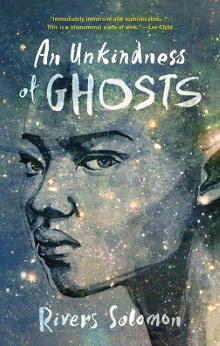
I’ve been trying to be more up to date on current science-fiction books and this is one of the most talked about ones recently. It is the debut novel of its author, Rivers Solomon, who self-identifies using the pronoun they and them, and indeed many of the characters in it have atypical genders. I was also attracted to its premise of reimagining the scenario of black slaves in the America South on board a generation ship. In the end however I didn’t like it as much as I thought I would as it leans so heavily on its inspirational sources that it’s barely much of a story on its own.
On board the vast ship Mathilda that has been travelling through space for many generations towards an unknown destination, society has long been stratified according to decks. The lighter skinned population live on the upper decks and live lives of luxury while the dark skinned ones are relegated to the lower decks and forced to labor in the fields where crops are grown under the light of an artificial sun. Aster is one of these denizens of the lower decks who continues to work in the fields even though her exceptional intelligence and studious nature has made her a competent healer. Due to her relationship with the ship’s Surgeon General however who has a strong affection for her, she is able to get away with a lot and even has her own secret laboratory on the ship. Her main project in her free time is deciphering the mysterious journals left by her mother who she believes committed suicide many years ago and has worked out some great secret about the ship.
The writing here is definitely strong with a strong literary bent that successfully the sense of being in the American South even as the whole novel takes place within a starship. Between how each deck has developed different cultures and even languages and how the upper classes justify this caste system by appealing to religious authority, down to explicitly stating that the master of the ship is a direct representative of God, there is plenty of color too. Add to that the fact that every major character seems to atypical gendering or are neurodivergent or both. Aster for example seems to have no interest in sex at all and though incredibly intelligent, she interprets language literally and is usually unable to understand metaphors. You really cannot fault this book for lack of ambition or richness of theme.
I would argue however the book is trying to do too much. Most obviously it’s about a slave caste being oppressed in a starship. But it’s also about a mother reaching back in time to Aster via her journals that seem to offer a way out. It’s also about the relationship between Aster and the Surgeon-General which everyone else dismisses as her merely being his mistress but in reality is much more complicated than that as Aster is clearly the dominant partner. It’s also about the unusual relationship Aster has with Giselle, somewhere between being lovers and being sisters as they role-play the traditional wife and husband as children. I’d argue that it’s overloaded in terms of theme at the expense of the plot and the worldbuilding.
The Mathilda exists only as a stage to explore the admittedly fascinating the characters and is so nakedly based on the American slave plantations that it doesn’t seem like a real place on its own. For example the workers make foods and medicines from the crops that they are forced to harvest that are directly inspired by the American South. For a while I was even convinced that Giselle isn’t a real character what with the way that she magically slips away, knows things Aster doesn’t and in Aster’s imagination represents a superhero from a comic book. I had serious problems with the plausibility of the setting, such as the inconsistency of the technology available on the ship, wondering why the guards don’t seem to have access to cameras and the like to keep the workers in line and questions about the sustainability of this closed ecosystem. Judging from the quality of life on the upper decks for example, it doesn’t seem like the system as a whole is in danger of collapse.
Of course, in making these comments, I am aware that I am reinforcing the stereotype of the typical male fan of science-fiction. I admit it, I like hard science-fiction, cool ideas about technology and solid worldbuilding. This novel is the opposite. This is the American South, transported as is onto a starship, nevermind how plausible or not that is. This is why the guards enforce order by physically making headcounts of the laborers and bludgeon and whip them, instead of anything more efficient. It is also an exploration of divergent sexualities because that is what interests the author and that’s all fine and good. But taken all together, this fails to satisfy me at all and I really did not like the ending which further strains the reader’s credulity. I do kind of get what the author is doing there. It’s a kind of escapist fantasy at the end and maybe it doesn’t even have to be real. I admire the book’s ambition and its willingness to experiment, but I still ended up not really liking it much.